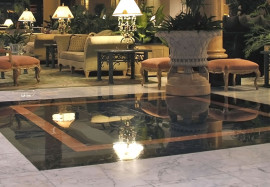In the service industry of stone restoration one of the most common requests is sealing to protect the surface of natural stone. A properly sealed natural stone surface; vanity, counter top or floor, will help the customer maintain their investment. We have found that a simple explanation of what a sealer actually is and more importantly how it will perform can be very useful. First and foremost, a well informed customer is important. Having the knowledge of some of the chemistry that goes into a sealer will be able help the service technician to answer the customer’s basic questions. This information can also be useful to determine whether the sealer has been misapplied or the wrong type sealer for a particular type of stone has been used.
The terminology “sealing’ can be confusing to the consumer. The most common definition of” sealer” and what most consumers believe is that the performance of a sealer is a coating or in the service trade known as a “film former” that when applied forms a protective film or coating on the surface of the stone, just like a coat of paint or varnish. While there are products out there that produce this effect it is merely a coating and is not designed to work as a true sealer or “Impregnating Sealer internetapotheke viagra rezeptfrei.”
Impregnating sealers (also known as penetrating sealers) are designed to penetrate below the surface and protect from within the stone while still allowing the miniscule pores of the stone to allow moisture vapor to escape. Impregnators reduce the pore size of the stone by filling the pores with solids typically made up of a resin. The resins are small enough to prevent complete blockage of the pores, so the stone will still allow vapor to pass through while not allowing a liquid to penetrate. When a stone's pores are completely blocked, moisture vapor will condense within the stone and the stone will be saturated with moisture. This can lead to a variety of problems such as spalling, iron oxidation and efflorescence.
Choosing what type of Impregnating Sealer to use.
Most Impregnating Sealers contain one of two main ingredients: A silicone derivative which is designed to repel water and a fluoro aliphatic resin derivatives such as polymers which repel both water and oil. Impregnating sealers can be water based or solvent based. Choosing the correct type can be very important to the performance of the sealer and the particular type of stone. In general solvent based sealers usually have smaller solids that will penetrate tighter grained stones. Water based sealers typically have larger” solids” which are better for more porous stones. Carefully determining what type of sealer to use can save many hours of time on site if the surface is soaking up the sealer like a sponge. The main job of a good impregnating sealer is to create a high surface tension so stains are not able to penetrate deep. This knowledge can save the service contractor a lot of money and time






